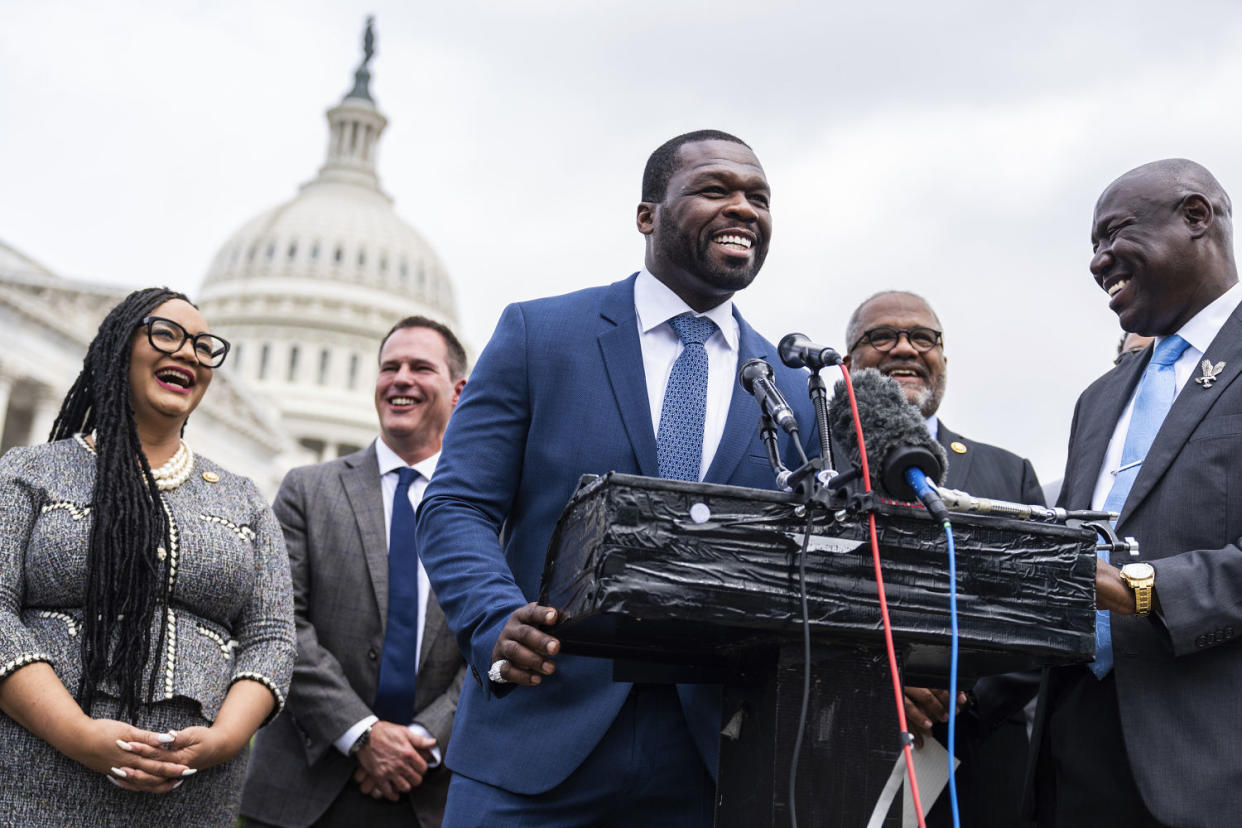50 Cent's Capitol Hill appearance was an embarrassing spectacle

Rapper 50 Cent’s appearance on Capitol Hill on Wednesday was a cringe-inducing spectacle.
The rapper (real name Curtis Jackson) visited Washington, D.C., with civil rights attorney Benjamin Crump for what Crump characterized as discussions about “the Black wealth agenda, the widening of the wealth gap, and corporate America’s marginalization of Black-owned companies.”
I suspect the visit was more transactional: Jackson, Mr. “Get Rich or Die Tryin’,” invests in a liquor brand and media ventures, Crump is on his legal team, and the two wanted to endear themselves to members of Congress (as evidenced by a veiled reference to his legal battle with liquor company Beam Suntory in a post on X).
But whatever their purpose, some of the comments Jackson made on the occasion left a bad taste in folks’ mouths. Jackson — who endorsed Donald Trump in 2020 and has used his social media accounts to push conservative talking points this election cycle — told the press that Black men are starting to identify with Trump and that criminality is a main reason.
“Because they got RICO charges,” Jackson said, referring to Black men, on the one hand, and to the racketeering charges that Trump and his co-defendants are facing in Georgia on the other (he has pleaded not guilty).
50 Cent believes black men are identifying with Trump pic.twitter.com/qN91avOCxo
— Daily Mail Online (@MailOnline) June 7, 2024
He also made sure to stop for smiling photos with lawmakers, including House Speaker Mike Johnson and Reps. Nancy Pelosi, D-Calif., Troy Carter, D-La., Steve Scalise, R-La., and Lauren Boebert, R-Colo.
Lauren Boebert, Colorado Republican making the white house look good. 😏 pic.twitter.com/GJnb9UnLbE
— 50cent (@50cent) June 5, 2024
(For the record, that photo was taken in the U.S. Capitol, not at the White House.)
Jackson’s appearance on Capitol Hill, his comments about Black men’s supposed criminality and his photos with Johnson and Boebert (both of whom sought to overturn the 2020 election while hyping false allegations of voter fraud) earned eye rolls from Black commentators online. See here, here, here, here and here.
The rapper’s reaction to the response was fairly juvenile, which just underscores why people were dismayed at the spectacle to begin with: It reeked of unseriousness at a time when we should expect better from people who claim to advocate on our behalf.
Wait, wait, guys i took pictures with everyone and all you seem to care about is Lauren 🤷🏽♂️what did she do in a dark theater that hasn’t been done, my God ! Hey I don’t have chlamydia by the way. LOL pic.twitter.com/DxBJvqSkuJ
— 50cent (@50cent) June 6, 2024
And look, none of us should be surprised when Jackson, or any rapper (a class of artists that tends to glorify misogyny and shrewd capitalism), identifies with Trump or the MAGA movement.
But the critiques of Jackson’s visit also reflect a broader problem that afflicts D.C. elites these days — lawmakers, journalists and seemingly everyone in between. Many of these people seem obsessed with rappers, specifically with positioning them as avatars for Black voters. This is easily among the most ridiculous phenomena I’ve witnessed this election cycle. Whether it’s Trump and his supporters thinking endorsements from rappers will translate to a spike in Black support, or the media turning to rappers (especially male rappers) as though they represent the median, purportedly disaffected Black voter, I’m noticing a failure — or refusal — to differentiate between Black people who entertain other Black people and Black people who actually represent or influence other Black people.
Rhythmic head nods are not endorsements. Just because some Black people enjoy an artist’s music or creativity doesn’t mean we give a damn about their political opinions. And that certainly doesn’t mean they have the standing to speak as our representatives in Washington or in discussions with the media. (Just last month, I wrote about USA Today and Suffolk University’s polling data that shows most people don’t rely on celebrity endorsements to decide their vote.)
So when you see people tapping rappers as Black spokespeople, ask yourself: Whose agenda are they really serving? Are there more reputable sources elsewhere, people who are actually talking with Black voters and who represent communities of color? Or could it be an effort to manufacture the appearance of Black support for Trump or some other viewpoint?
In the meantime, let’s hope D.C. insiders do us all a favor and limit their obsession with rappers to Spotify playlists.
This article was originally published on MSNBC.com
